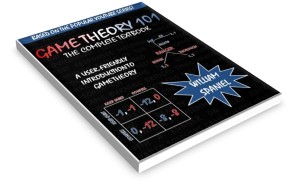Throughout the course thus far, we have assumed that everyone is on equal footing when it came to information over payoffs. In practice, this is not always realistic. In a business negotiation, a purchasing firm might not know the marginal cost a producing firm faces. In war, one state might not know how much the other cares about a strip of disputed territory. Such games have incomplete information. Solving for such scenarios is substantially more complicated than the complete information environments that we have explored before. This unit begins the process of learning how to do that.
Takeaway Points
- A game has complete and perfect information when everyone knows everything that has happened in the past when they move, and no one has private information about anyone’s payoff. The burning bridges game is an example of this.
- A game has imperfect information when a player does not know what someone has done before. Standard 2×2 matrix games like the prisoner’s dilemma fall in this category.
- A game has incomplete information when someone has information about payoffs that another player does not have.
- Examples of this include me not knowing whether you like the ballet a lot or just a little in the battle of the sexes or if you are better at aiming to the left or the right in a soccer penalty kick.
- The previous solution concepts we have explored are insufficient to address these games. So far, we have only had one set of strategies per actor. But here there are multiple “types” of actors. For example, we should think about how a striker with a more accurate left side might want to pursue a different strategy than a striker with a more accurate right side.
- We must work on two different types of solution concepts with incomplete information. First, there is Bayesian Nash equilibrium. This is the extension of Nash equilibrium to games with incomplete information. Thus, we will apply it to simultaneous move games. Second, there is perfect Bayesian equilibrium. This is the extension of subgame perfect equilibrium to extensive form games with incomplete information. We will introduce this formally in the next unit.

